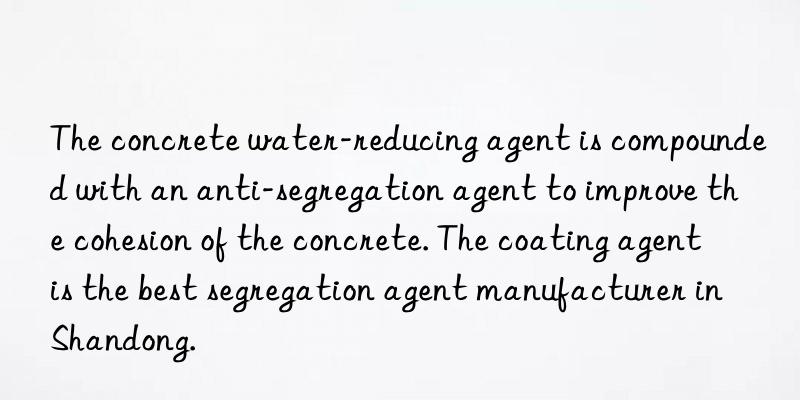
Anhui Yulong New Material Technology Co., Ltd. produces anti-segregation agents, which are pure biological fermentation and pollution-free. Its main products include concrete anti-segregation agents, mortar anti-segregation agents, and anti-segregation agents. The anti-segregation agent is cheap and has a large output, which greatly reduces the production cost. It replaces the originally used anti-segregation agent and is much cheaper than cellulose. Welcome to inquire
Concrete water-reducing agent is compounded with an anti-segregation agent to improve the adhesion of concrete. Polymerization
Plastic cracks in concrete
Phenomenon: The surface of the crack structure appears irregular in shape and length, incoherent and similar to a dry mud surface. Most of the concrete is in the early stages of pouring (generally About 4 hours after pouring). It occurs when the concrete surface itself is very different from the outside temperature, or the temperature itself is too high (above 40°C) for a long time, and the climate is very dry. Plastic cracks are also called cracks.
Preventive measures: When preparing concrete, the water-cement ratio and cement dosage should be strictly controlled, well-graded stones should be selected, the void rate and sand rate should be reduced, and the concrete should be compacted to reduce shrinkage. Water the base and formwork thoroughly before pouring concrete. After the concrete is poured, the exposed surface should be covered with moist materials and maintained carefully. When constructing in weather with high temperature, low humidity or high wind speed, water spraying and curing should be carried out in time after pouring the concrete to keep it moist; for large areas of concrete, it is best to pour one section after pouring and then to maintain the other section. At this time, the surface plastering and maintenance work should be strengthened. . When maintaining concrete, methods such as covering it with wet straw bags or plastic films can be used. When cracks appear on the surface, they should be pressed once in time and then covered and maintained.
Double eyelids, clouds
1. Phenomenon: Double eyelids: A layer of cement skin is attached to the outer surface of the concrete, which will fall off at the slightest touch; Clouds: Dark black watermarks appear on the surface of the concrete, resembling clouds.
2. Reason analysis: The main reason for the appearance of double eyelids is the formwork running. For example, the two pourings of precast beams are due to the restriction of construction conditions. The construction method of first pouring the bottom slab concrete and then pouring the web and roof concrete is used. The secondary pouring has the following disadvantages: a. Since the bottom slab concrete has already initially set when the web and roof concrete is poured, construction cold joints appear on the outer surface of the concrete. b. Even a slight movement of the side formwork will cause slurry and a layer of cement skin to appear below the joint line between the bottom plate and the web. Reasons for the appearance of clouds: a. After the concrete comes out of the chute, barrel, and hopper, it is vibrated without manual leveling. Especially when it is near the formwork, water easily flows onto the formwork and forms water ripples. b. The new formwork was not polished and was used to pour concrete before being assembled. This is also one of the reasons for the formation of clouds.
7. Sand slide
1. Phenomenon: The concrete surface lacks cement slurry and presents a sand line.
2. Reason analysis: The joints of the formwork were not filled with sealing rubber strips or sponge strips, and the cement slurry was lost due to leakage of the formwork during concrete pouring.
Defects in formwork construction
1. Phenomenon: formwork explosion, tilt deformation. The flatness of the assembled template is poor
. 3. Preventive measures: Use pull bolts, horizontal supports, diagonal supports and other measures to ensure that the formwork cannot be exploded. Replace the deformed and unusable formwork to ensure that the assembled formwork meets the requirements. The thickness of each layer of concrete pouring is controlled to about 30cm. It is recommended to use fixed large-area templates or overall assembled templates. 9. Honeycombing on the surface of concrete structures 1. Phenomenon: The concrete is partially loose, there is less mortar, and there are many stones. There are gaps between the stones, forming honeycomb-shaped holes.
Product features:
1. Improve system viscosity: The aqueous solution of this product has good viscosity and consistency. When used in concrete, it can make the concrete have good viscoelasticity, plasticity and toughness, and can effectively improve Concrete is prone to cracks, hollowing, blistering, peeling and other phenomena.
2. Improve workability: This product can improve the fluidity of concrete mixture under low water-binder ratio conditions, while ensuring good cohesion and stability, preventing bleeding and segregation, and making the concrete The structure is more uniform, the pumping process is smoother, and it is less likely to cause blockage and other phenomena.
3. Improved constructability: This product has strong slump-preserving ability and strong adaptability to cement varieties, models and temperatures, and is almost unaffected by changes in external temperature.
4. Good compatibility: This product is a high-molecular biopolymer with strong acid and alkali resistance. It does not react with other materials in the components and is compatible with all commonly used additives including naphthalene, melamine and polycarboxylic acid. All admixtures are compatible.
5. Green and environmentally friendly: This product is polymerized from high molecular biopolymers and does not cause pollution to the natural environment during production and use.
Product indicators:
The factory standards for this product are as follows:
Item Targets Accurate
Appearance off-white powder
Particle size (passing 0.28mm aperture sieve) % ≥ 95
pH (1% aqueous solution, 25) 6.5-8.5 13
Viscosity (0.5% tap water solution, 25) mpa.s ≥ 1200
Flow pattern index (N value) ≤ 0.5
Shear performance value ≥ 7.0

 微信扫一扫打赏
微信扫一扫打赏

